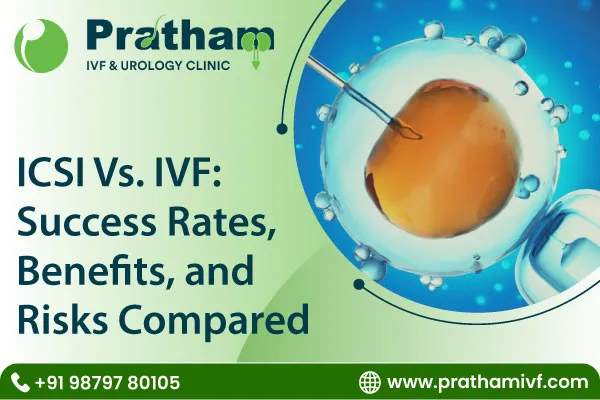
When couples face infertility challenges, assisted reproductive technologies like In Vitro Fertilization (IVF) and IntraCytoplasmic Sperm Injection (ICSI) offer promising paths to parenthood. Both procedures involve fertilizing eggs outside the body, but they differ in technique, application, and sometimes outcomes. Understanding the success rates, benefits, and risks associated with ICSI and IVF helps couples and healthcare providers make informed choices tailored to individual fertility needs.
This comprehensive guide explores these two widely used fertility treatments, compares their effectiveness, highlights their unique advantages, examines potential risks, and discusses financial considerations. With expert care and personalized treatment, couples can find hope and clarity on their journey to parenthood.
Understanding ICSI and IVF
IVF involves combining eggs and sperm in a laboratory dish, allowing fertilization to occur naturally. After fertilization, the embryo is transferred into the woman's uterus to develop. ICSI is a specialized form of IVF where a single sperm is directly injected into an egg using a microscopic needle. ICSI is typically recommended when there are significant male infertility issues, such as low sperm count or poor sperm motility.
Success Rates
Success rates for both IVF and ICSI vary based on multiple factors:
- Age of the woman: Younger women generally experience higher success rates with both treatments.
- Underlying fertility issues: Severe male infertility may favor ICSI, while unexplained infertility may be addressed with standard IVF.
- Previous treatment history: Couples who have not succeeded with IVF may be recommended ICSI as a next step.
Statistical Comparison:
- IVF success rates generally range from 40% to 50% for women under 35, declining with age.
- ICSI success rates are comparable to IVF in cases of male infertility, often around 45% for younger women, but depend heavily on egg quality.
- Overall, ICSI does not necessarily improve success rates for couples without male infertility but provides a higher chance of fertilization when sperm issues exist.
Benefits of ICSI and IVF
Benefits of ICSI
- Effective for male infertility: ICSI allows fertilization even with very low sperm counts or poor sperm quality.
- Genetic testing potential: ICSI embryos can undergo preimplantation genetic diagnosis (PGD) or screening.
- Higher fertilization rates: Direct sperm injection often leads to better fertilization rates in problematic cases.
Benefits of IVF
- Versatility: IVF treats a wide range of fertility problems, including tubal blockage, endometriosis, and unexplained infertility.
- Embryo freezing: IVF allows freezing of extra embryos for future attempts.
- Less invasive fertilization: IVF allows natural sperm-egg interaction, reducing manipulation of the egg.
Risks of ICSI and IVF
Risks of ICSI
- Genetic concerns: Slightly increased risk of genetic abnormalities, though most children are healthy.
- Egg damage: The injection process may damage eggs.
- Technical complexity: Requires skilled embryologists and specialized equipment.
Risks of IVF
- Multiple pregnancies: Can lead to twins or triplets, increasing risks.
- Ovarian Hyperstimulation Syndrome (OHSS): Possible complication from hormonal medications.
- Emotional stress: Treatment involves hormonal shifts and uncertain outcomes.
Both treatments carry risks of ectopic pregnancy and miscarriage, which require close medical monitoring.
Comparison of Costs and Success Rates
IVF and ICSI have similar overall costs; however, ICSI is typically more expensive due to its technical nature. When considering financial investment:
- IVF is generally cost-effective for couples without severe male infertility.
- ICSI may offer better value for couples with male factor infertility.
- Success rates and potential additional cycles should be factored into cost planning.
Couples should discuss financial options and insurance coverage with their healthcare providers to plan effectively.
Why Choose Pratham IVF Center for ICSI in Ahmedabad?
Pratham IVF Center is widely recognized as the best ICSI centre in Ahmedabad, known for its expert care, personalized treatment plans, and advanced fertility solutions. Our experienced fertility specialists provide compassionate guidance and support at every step of your journey. Equipped with innovative technology, Pratham IVF Center ensures high-quality procedures tailored specifically to your unique fertility profile. Our team focuses on maximizing success rates while minimizing stress and physical discomfort for couples seeking to conceive.
Choosing the best ICSI treatment in Ahmedabad means choosing a center committed to your overall wellness and success. We understand the emotional and physical challenges of fertility treatments and work closely with you to provide comprehensive care. If you are ready to take the next step toward parenthood, contact Pratham IVF Center today. Our dedicated team is here to support and guide you through your fertility journey with expert advice and personalized care, helping you achieve your dream of building a family.
Conclusion
Both IVF and ICSI are powerful fertility treatments with their benefits, risks, and ideal applications. IVF is versatile and effective for many fertility issues, while ICSI is particularly suited for male infertility and cases requiring direct sperm injection. Success rates for both are comparable when used appropriately, but individual factors such as age, health, and fertility diagnosis influence outcomes. Understanding the risks—including potential genetic concerns, multiple pregnancies, and emotional impact—is essential. Cost considerations also play a key role in treatment decisions. Consulting with fertility specialists at trusted centers like Pratham IVF Center can help couples choose the right path, tailored to their needs. With expert support and advanced treatments, many couples achieve their dream of parenthood despite fertility challenges.
Book your appointment today at Pratham IVF Center, Ahmedabad. Contact: +91 98797 80105, Email: prathamivf@gmail.com
 Ahmedabad Top Rated IVF Center
Ahmedabad Top Rated IVF Center




